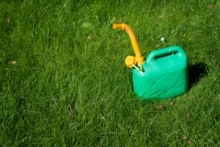Our Scrappage, Recycling and Car Blog
later post | index | earlier post
Petrol prices to rise
Wednesday, 24 July 2013
 Rises in wholesale petrol prices could see pump prices increase by 5p a litre, analysts have stated.
Rises in wholesale petrol prices could see pump prices increase by 5p a litre, analysts have stated.
The current price of petrol is 136.26p a litre and 140.7p for diesel, equating to £102.20p and £105.70p respectively to fill a typical family car.
AA Spokesman, Luke Bosdet, said: “There is the threat of a 5p price hike on petrol over the next few weeks. Just when the summer was looking to be perfect motorists are hit by this, casting a black cloud over what was promising to be a glorious summer.”
A report by the AA claims that the wholesale cost of petrol has increased by $100 dollars a tonne across northern Europe; other factors include a weakening pound against the dollar and rising production and transportation costs. Financial speculation within the industry is also rife, creating further price pressure:
“The most chilling observation in all this is that speculators are betting on rising fuel prices. That means that people are playing a casino with the livelihoods of every family and business that relies on fuel,” said FairFuelUK spokesman Quentin Willson.
“The Government needs to cut fuel tax and apply pressure to make sure the casino traders are not deliberately manipulating the market for their own personal and corporate gain.”
Last year the petrol industry was cleared of price-fixing by the Office of Fair Trading, who attributed rising prices to high wholesale prices and heavy government fuel taxes.
Fuel duty in the UK is currently around 42 per cent of the overall pump price, rising to 60 per cent including VAT, higher than in any other major economy. A rise in fuel duty was cancelled by Chancellor George Osborne in September as part of the latest budget.
Revenues from fuel duty and road tax currently exceed spending on roads by £30 billion per year; meanwhile, investment in road improvements has also fallen dramatically over the last 20 years.
According to the RAC, the Treasury collects more than £40bn in motoring taxes each year but this year spent just 22 per cent on improving and maintaining roads. Despite increases in the taxes associated with motoring, three-quarters of motorists felt that the quality in British roads has fallen in recent years.
According to the AA, petrol and diesel sales have fallen by 20 per cent since 2007, largely attributed to development in fuel efficient vehicle technology and rises in oil prices.
With investment in ultra-low carbon cars now growing steadily year-on-year, there is strong evidence to suggest that petrol consumption will continue to fall in the next two decades.
A study by LowCVP has found that the cost of owning an electric vehicle will fall substantially over the next twenty years, offering motorists considerable cost benefits:
“This study indicates that the cost of electric and hydrogen fuel cell vehicles will fall substantially and with modest tax and other incentives could be as cheap to own as conventional cars within the next 15-20 years,” said LowCVP Managing Director Greg Archer.
Many consumers are now taking steps to reduce their overall motoring costs by trading-in their conventional vehicle for an ultra-low carbon car.
later post | index | earlier post
Categories
- Car Maintenance 26
- Driverless Vehicles 2
- Driving Abroad 4
- Economy 8
- Environment 5
- Insurance 2
- Light-Hearted 1
- Manufacturers 7
- Motoring Guides 6
- Motorways 6
- New Car Sales 6
- Safety 11
- Salvage 12
- Social & Community 2
- Used Cars 20
- Winter Driving 3
Recent posts
- How to tax your car (the complete guide)
- Basic Car Maintenance: How to change your spark plugs
- The complete guide to replacing a fuel filter
- How to scrap a car
- How tyre damage can hinder performance
- Thinking about scrapping a car this Christmas?
- Basic car maintenance: Replacing the horn on a car
- Hydrogen Powered Cars in the UK
- How to Change your Engine Oil
- How To Change Rear Lights in a Car
- Can I sell my car without the log book?
- Basic Car Maintenance: How to change your car battery yourself
- The growing interest in eco-friendly cars
- How to change windscreen wiper blades
- The best small cars to buy second-hand